Fleurs du Mal Magazine


Or see the index
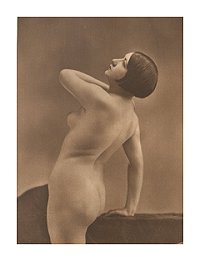
Hoer
Op de Spoorlaan staat
een oude hoer
zij wordt wel duurder
maar niet mooier
zij lacht ons toe
wij stoer als gluurders
zij beschouwt ons
als haar pooiers
deze dame wordt
niet graag opgeschud
een verbouwing vindt
ze best wel kut
dus kwam perron één als
plamuur al naar beneden
al dat gezeik verspilde tijd
al dat behouden voor de eeuwigheid
vraag het haar en zij
leeft liever in ‘t verleden
ze moest een facelift werd gezegd
en haar geheime opening werd
meejpassant ook blootgelegd
daar mogen wij straks fietsen
met grof geweld verschaffen
we ons de toegang
de dame wordt er nu al
een beetje moe van
maar er is betaald en zij heeft niets te kiezen
als een geheime minnaar
wij waren allen in haar
voelden ons krek een winnaar
en we nemen nu wat zij niet meer
zelf aan ons geven kon
een tunnel van noord
naar zuid en omgekeerd
in de reet van een station.
martin beversluis
(gedicht naar aanleiding van de verbouwing van het Centraal Station van Tilburg – 2014)
fleursdumal.nl magazine
More in: Archive A-B, Beversluis, Martin

The Sorrows of Young Werther (68) by J.W. von Goethe
A recollection of that mysterious estrangement which had lately
subsisted between herself and Albert, and which she could never
thoroughly understand, was now beyond measure painful to her. Even the
prudent and the good have before now hesitated to explain their mutual
differences, and have dwelt in silence upon their imaginary grievances,
until circumstances have become so entangled, that in that critical
juncture, when a calm explanation would have saved all parties, an
understanding was impossible. And thus if domestic confidence had been
earlier established between them, if love and kind forbearance had
mutually animated and expanded their hearts, it might not, perhaps, even
yet have been too late to save our friend.
But we must not forget one remarkable circumstance. We may observe from
the character of Werther’s correspondence, that he had never affected
to conceal his anxious desire to quit this world. He had often discussed
the subject with Albert; and, between the latter and Charlotte, it had
not unfrequently formed a topic of conversation. Albert was so opposed
to the very idea of such an action, that, with a degree of irritation
unusual in him, he had more than once given Werther to understand that
he doubted the seriousness of his threats, and not only turned them into
ridicule, but caused Charlotte to share his feelings of incredulity.
Her heart was thus tranquillised when she felt disposed to view
the melancholy subject in a serious point of view, though she never
communicated to her husband the apprehensions she sometimes experienced.
Albert, upon his return, was received by Charlotte with ill-concealed
embarrassment. He was himself out of humour; his business was
unfinished; and he had just discovered that the neighbouring official
with whom he had to deal, was an obstinate and narrow-minded personage.
Many things had occurred to irritate him.
He inquired whether anything had happened during his absence, and
Charlotte hastily answered that Werther had been there on the evening
previously. He then inquired for his letters, and was answered that
several packages had been left in his study. He thereon retired, leaving
Charlotte alone.
The presence of the being she loved and honoured produced a new
impression on her heart. The recollection of his generosity, kindness,
and affection had calmed her agitation: a secret impulse prompted her
to follow him; she took her work and went to his study, as was often
her custom. He was busily employed opening and reading his letters.
It seemed as if the contents of some were disagreeable. She asked some
questions: he gave short answers, and sat down to write.
Several hours passed in this manner, and Charlotte’s feelings became
more and more melancholy. She felt the extreme difficulty of explaining
to her husband, under any circumstances, the weight that lay upon her
heart; and her depression became every moment greater, in proportion as
she endeavoured to hide her grief, and to conceal her tears.
The Sorrows of Young Werther (Die Leiden des jungen Werther) by J.W. von Goethe. Translated by R.D. Boylan.
To be continued
fleursdumal.nl magazine
More in: -Die Leiden des jungen Werther, Goethe, Johann Wolfgang von
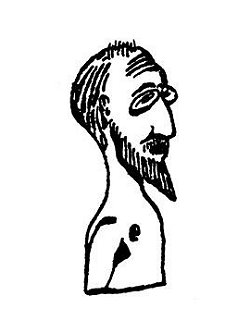
Erik Satie
(1866 – 1925)
Méditation
à Albert Roussel.
Un peu vif
Le Poète est enfermé dans sa vieille tour.
Voici le vent.
Le Poète médite, sans en avoir l’air.
Tout à coup il a la chair de poule.
Pourquoi ?
Voici le Diable !
Non, pas Lui : c’est le vent, le vent du génie qui passe.
Le Poète en a plein la tête,
du vent !
Il sourit malicieusement, tandis que son cœur pleure comme un saule.
Mais le Génie est là ! qui le regarde d’un mauvais œil : d’un œil de verre.
Et le Poète devient tout humble et tout rouge.
Il ne peut plus méditer : il a une indigestion !
une terrible indigestion de mauvais vers blancs et de
Désillusions amères !
6 octobre 1915
Erik Satie Méditation
fleursdumal.nl magazine
More in: Archive S-T, MUSIC, Satie, Erik
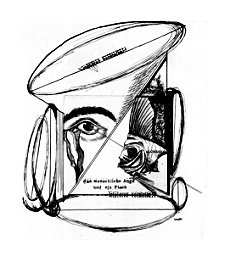
Johannes Theodor Baargeld
(1892-1927)
Du folgst jetzt all den Wegen
Du folgst jetzt all den Wegen,
Die durch dich ziehn.
Sie scheinen Dir gelegen
Mit eignen Mühn.
Du glaubst dem fernsten Winken
Ob es Dir galt?
Die fernen Zinnen sinken,
Doch Du warst kalt.
Schon lang sind Deine Höhen
Im Dunst gelöst.
Es ist bald wie ein Stehen,
Nun Deinen Weg Du weitergehst.
(1923)
Johannes Theodor Baargeld poetry
fleursdumal.nl magazine
More in: Archive A-B, Baargeld, Johannes Theodor, Dada

The Sorrows of Young Werther (67) by J.W. von Goethe
Charlotte had slept little during the past night. All her apprehensions
were realised in a way that she could neither foresee nor avoid. Her
blood was boiling in her veins, and a thousand painful sensations rent
her pure heart. Was it the ardour of Werther’s passionate embraces that
she felt within her bosom? Was it anger at his daring? Was it the sad
comparison of her present condition with former days of innocence,
tranquillity, and self-confidence? How could she approach her husband,
and confess a scene which she had no reason to conceal, and which she
yet felt, nevertheless, unwilling to avow? They had preserved so long a
silence toward each other and should she be the first to break it by so
unexpected a discovery? She feared that the mere statement of Werther’s
visit would trouble him, and his distress would be heightened by her
perfect candour. She wished that he could see her in her true light, and
judge her without prejudice; but was she anxious that he should read her
inmost soul? On the other hand, could she deceive a being to whom all
her thoughts had ever been exposed as clearly as crystal, and from whom
no sentiment had ever been concealed? These reflections made her anxious
and thoughtful. Her mind still dwelt on Werther, who was now lost to
her, but whom she could not bring herself to resign, and for whom she
knew nothing was left but despair if she should be lost to him for ever.
The Sorrows of Young Werther (Die Leiden des jungen Werther) by J.W. von Goethe. Translated by R.D. Boylan.
To be continued
fleursdumal.nl magazine
More in: -Die Leiden des jungen Werther, Goethe, Johann Wolfgang von
Thomas Hardy
(1840-1928)
Ah, Are You Digging on My Grave?
“Ah, are you digging on my grave
My loved one? — planting rue?”
— “No, yesterday he went to wed
One of the brightest wealth has bred.
‘It cannot hurt her now,’ he said,
‘That I should not be true.'”
“Then who is digging on my grave?
My nearest dearest kin?”
— “Ah, no; they sit and think, ‘What use!
What good will planting flowers produce?
No tendance of her mound can loose
Her spirit from Death’s gin.’ “
“But some one digs upon my grave?
My enemy? — prodding sly?”
— “Nay: when she heard you had passed the Gate
That shuts on all flesh soon or late,
She thought you no more worth her hate,
And cares not where you lie.”
“Then, who is digging on my grave?
Say — since I have not guessed!”
— “O it is I, my mistress dear,
Your little dog, who still lives near,
And much I hope my movements here
Have not disturbed your rest?”
“Ah yes! You dig upon my grave . . .
Why flashed it not on me
That one true heart was left behind!
What feeling do we ever find
To equal among human kind
A dog’s fidelity!”
“Mistress, I dug upon your grave
To bury a bone, in case
I should be hungry near this spot
When passing on my daily trot.
I am sorry, but I quite forgot
It was your resting-place.”
Thomas Hardy poetry
fleursdumal.nl magazine
More in: Archive G-H, Hardy, Thomas
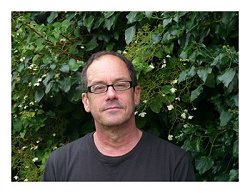
Die ritueel
door Charl-Pierre Naudé
Snaaks hoe dinge met ’n doel gedoen word,
en dan lyk dit so na die skep van chaos
van hier by my tafeltjie waar ek sit en rook.
Daai twee wat vroeër verbygestap het,
die karre wat heen en weer oor die nat teer fluit –
beplanning sit daaragter, hoor.
Alles vergeetbaar, nietemin, van hier, behalwe
die triestige groen bakkie wat nou meer as een keer
aan die voet van die restaurantterras verbygevaar het.
Met sy laaste rit het iemand alleen agter
op die oop bak gestaan, hande seremonieel
op die kajuitreëling, en toegegooi onder ’n swart seil.
Ekstra stadig word daar bestuur, soos in ’n stoet;
toe merk ek dié “passasier”, só kierts, moet
ʼn rekwisiet wees, want g’n ledemaat van hom beweeg nie.
Só moes Julius Caesar op sy strydwa gery het
met die herdenkings van sy seges
jare ná sy dood, onder ’n lanferlap
op pad na die arena as ’n beeld vir die onthulling.
En weer het die ritueel verby gekom (triomfantelik?).
Seker iets by die huis vergeet, kon my nie skeel nie.
Ek fantaseer toe die figuur is ʼn terdoodveroordeelde;
en terwyl motreën uit die bewolktheid neersif
wonder ek wat die wyse van sy teregstelling gaan wees.
Ná my koffie het ek huis toe geloop
en die gedoente weer teëgekom, dié keer by sy eindpunt:
ʼn Lint oor die grasperk het huisraad verdeel.
Die vrou het by haar kind gestaan, en die man daar wat sy seil
styf span oor sy hoop goed op die bakkie, hý het gehuil.

Het Ritueel
door Charl-Pierre Naudé in een vertaling van Willy Martin
Vreemd hoe doelgericht de dingen lopen,
terwijl zij eerder op een chaos lijken
voor wie, als ik, aan een tafeltje zit te roken en kijkt.
Die twee die daarnet langs gekomen waren,
het sissen heen en weer van wielen over nat asfalt—
daar steekt een planning achter, hoor.
Toch wordt van hieruit alles licht vergeten, behalve
dat kleine groene bakkie dat voor de tigste keer
voorbij het restaurantterras is gepasseerd.
De laatste maal stond iemand heel alleen
in de open achterbak, de handen ceremonieel
bovenop de stuurcabinereling, de rest onder een zwart zeil.
Heel traag, als in een stoet, werd er gereden;
pas toen begreep ik dat hij, de ‘passagier’, kaarsrecht,
een rekwisiet moest wezen, geen ledemaat zag ik bewegen.
Zó moet in zijn strijdwagen Julius Caesar voorbijgereden zijn
bij de herdenking van zijn zeges
jaren nà zijn dood, onder een crêpe rouwgewaad
op weg naar de arena waar zijn standbeeld werd onthuld.
En weer trok (triomfantelijk?) het ritueel voorbij.
Zeker thuis wat vergeten, wat kon het mij ook schelen.
Later verbeeldde ik mij dat deze man ter dood veroordeeld was;
en terwijl uit de bewolkte hemel een fijne regen daalde
vroeg ik mij af hoe hij zou worden omgebracht.
Mijn koffie op, kwam ik, op weg naar huis,
dezelfde stoet weer tegen,
dit keer daar waar zijn eindpunt was:
Een lint over het gazon verdeelde het huisgerei.
De vrouw stond bij het kind, en hij, de man die ’t zeil
over zijn goed in ’t bakkie had gespannen, hij huilde.
(vertaald/bewerkt van het Zuid-Afrikaans in het Nederlands door Willy Martin)
In de serie Vertaalvrucht nr. 8
fleursdumal.nl magazine
More in: Archive M-N, Charl-Pierre Naudé, Naudé, Charl-Pierre, VERTAALVRUCHT, Willy Martin
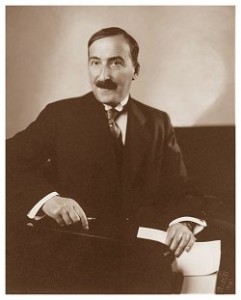
Stefan Zweig
(1881-1942)
Meine Liebe
Ich hasse Frauen mit dem satten Lächeln,
Das nur Erfahrung und Gewohnheit gibt,
Die prahlerisch gereifte Reize fächeln. –
Ich hasse den, der solche Schönheit liebt.
Aus stillen Augen will ich Funken schlagen
Bis sie in heißer Liebeslust erglühn,
Will blassen Mädchen meine Träume sagen,
Durch deren Parke ihre Bilder ziehn.
Will Glieder fühlen, die es nicht verspürten,
Daß sie dem Leben schon herangereift,
Die Lippen schmiegen auf die unberührten,
Die nie ein tatgewordner Wunsch gestreift.
Ich will nur elfenzarte Finger küssen,
Durch die das Blut mit blassem Leuchten rinnt,
Ich liebe Mädchen, die nicht Wahrheit wissen,
Ein armes, stilles lebensfremdes Kind.
Doch dieser weiß ich tausend Seligkeiten
Aus unverbrauchter Jugend heißer Glut,
Um ihre Glieder will ich Königspurpur breiten
Wenn sie im Banne meiner Arme ruht.
Sie will ich dann das Glück der Liebe lehren,
Das weit hinauf in Himmelsfernen trägt,
Sowie von opferflammenden Altären
Die Lohe jauchzend zu den Sternen schlägt …
Stefan Zweig poetry
fleursdumal.nl magazine
More in: Archive Y-Z, Stefan Zweig, Zweig, Stefan

The Sorrows of Young Werther (66) by J.W. von Goethe
“I knew that I was dear to you; I saw it in your first entrancing look,
knew it by the first pressure of your hand; but when I was absent from
you, when I saw Albert at your side, my doubts and fears returned.
“Do you remember the flowers you sent me, when, at that crowded
assembly, you could neither speak nor extend your hand to me? Half the
night I was on my knees before those flowers, and I regarded them as the
pledges of your love; but those impressions grew fainter, and were at
length effaced.
“Everything passes away; but a whole eternity could not extinguish the
living flame which was yesterday kindled by your lips, and which now
burns within me. She loves me! These arms have encircled her waist,
these lips have trembled upon hers. She is mine! Yes, Charlotte, you are
mine for ever!
“And what do they mean by saying Albert is your husband? He may be so
for this world; and in this world it is a sin to love you, to wish
to tear you from his embrace. Yes, it is a crime; and I suffer the
punishment, but I have enjoyed the full delight of my sin. I have
inhaled a balm that has revived my soul. From this hour you are mine;
yes, Charlotte, you are mine! I go before you. I go to my Father and to
your Father. I will pour out my sorrows before him, and he will give me
comfort till you arrive. Then will I fly to meet you. I will claim you,
and remain your eternal embrace, in the presence of the Almighty.
“I do not dream, I do not rave. Drawing nearer to the grave my
perceptions become clearer. We shall exist; we shall see each other
again; we shall behold your mother; I shall behold her, and expose to
her my inmost heart. Your mother–your image!”
About eleven o’clock Werther asked his servant if Albert had returned.
He answered, “Yes;” for he had seen him pass on horseback: upon which
Werther sent him the following note, unsealed:
“Be so good as to lend me your pistols for a journey. Adieu.”
The Sorrows of Young Werther (Die Leiden des jungen Werther) by J.W. von Goethe. Translated by R.D. Boylan.
To be continued
fleursdumal.nl magazine
More in: -Die Leiden des jungen Werther, Goethe, Johann Wolfgang von
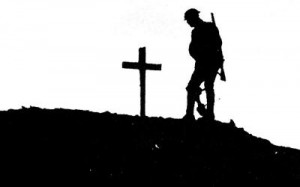
Alun Lewis
(1915 – 1944)
Goodbye
So we must say Goodbye, my darling,
And go, as lovers go, for ever;
Tonight remains, to pack and fix on labels
And make an end of lying down together.
I put a final shilling in the gas,
And watch you slip your dress below your knees
And lie so still I hear your rustling comb
Modulate the autumn in the trees.
And all the countless things I shall remember
Lay mummy-cloths of silence round my head;
I fill the carafe with a drink of water;
You say ‘We paid a guinea for this bed,’
And then, ‘We’ll leave some gas, a little warmth
For the next resident, and these dry flowers,’
And turn your face away, afraid to speak
The big word, that Eternity is ours.
Your kisses close my eyes and yet you stare
As though god struck a child with nameless fears;
Perhaps the water glitters and discloses
Time’s chalice and its limpid useless tears.
Everything we renounce except our selves;
Selfishness is the last of all to go;
Our sighs are exhalations of the earth,
Our footprints leave a track across the snow.
We made the universe to be our home,
Our nostrils took the wind to be our breath,
Our hearts are massive towers of delight,
We stride across the seven seas of death.
Yet when all’s done you’ll keep the emerald
I placed upon your finger in the street;
And I will keep the patches that you sewed
On my old battledress tonight, my sweet.
(1942)
War + Poetry: Alun Lewis
fleursdumal.nl magazine
More in: Archive K-L, Lewis, Alun
 De Parelduiker 2014/4-5
De Parelduiker 2014/4-5
Wie is L.Th. Lehmann?
Louis Th. Lehmann (1920-2012) was behalve dichter ook romanschrijver, essayist, criticus, jurist, scheepsarcheoloog, muzikant, tekenaar, danser, componist en vertaler. Alle talenten van deze eigenzinnige writer’s writer komen aan bod in dit nummer, zoals zijn fascinatie voor het surrealisme, de scheepsarcheologie, de tango, de jazz, de popmuziek en niet-bestaande woorden.
Erik Bindervoet vat Lehmanns leven in een strip en een lang gedicht. Verder zijn er bijdragen van Laurens Vancrevel, Matthijs van Boxsel, August Hans den Boef, Tom van Deel, Guus Janssen, Jaap van der Bent, Marsha Keja, Alida Beekhuis, Sjoerd van Faassen, Wim Noordhoek, Tsead Bruinja, Hans Plomp, Wim Brands, Dick Adelaar en Piet Calis. Remco Campert, Anneke Brassinga en Pieter Schermer eren Lehmann met een gedicht. Niet eerder gepubliceerde brieven, tekeningen, foto’s en andere documenten maken van dit nummer een waar bewaarexemplaar.
De Parelduiker is een tijdschrift over schrijvers en literatuur. Op een toegankelijke, niet-academische manier doet het verslag van enerverende, vaak amusante speurtochten naar de verborgen schatten van onze literatuurgeschiedenis. Onder het mom van het aan Multatuli ontleende motto ‘Een parelduiker vreest den modder niet’ belichten de medewerkers aan dit blad niet alleen de verborgen zijde van bekende auteurs, maar halen zij ook vergeten schrijvers boven water. De rubrieken ‘Laagwater’, voor de faits divers in de letterkunde, en ‘Seinpost’, waarin vanuit de pleisterplaatsen van literaire auteurs wordt bericht, maken De Parelduiker tot een bij uitstek prettig leesbaar blad, dat bij een groot aantal lezers en literatuurjournalisten gretig aftrek vindt.
De Parelduiker bestaat sinds 1996 en verschijnt vijf keer per jaar. De lay-out is van Piet Gerards, de opmaak wordt uitgevoerd door CeevanWee.
De redactie van De Parelduiker wordt gevormd door Hein Aalders, Marco Daane, Marco Entrop, Marsha Keja, Monica Soeting en Thijs Wierema.
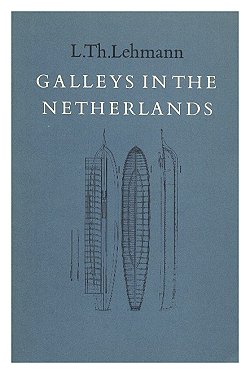
Wie is L.Th. Lehmann? 12 november in de Tolhuistuin
Op 1 november verscheen het nieuwe nummer van De Parelduiker: een dubbele editie over het multitalent Louis Lehmann. Ter viering van deze speciale gebeurtenis organiseert De Parelduiker i.s.m. de SLAA een feestelijke avond vol muziek, beeldfragmenten en poëzie over deze dichter, romanschrijver, essayist, criticus, jurist, scheepsarcheoloog, muzikant, tekenaar, danser, componist en vertaler op woensdagavond 12 november om 20 uur in de Tuinzaal van de Tolhuistuin, Buiksloterweg 5C, 1031 CC Amsterdam (meteen links na aanleg pont CS/Buiksloterweg, ingang onder restaurant THT).
M.m.v. Erik Bindervoet, Wim Noordhoek, Charlotte Mutsaers, Hugo Koolschijn, Guus Janssen en Han Bennink. Presentatie Jasper Henderson.
Toegang voor Vrienden van De Parelduiker vrij, voor abonnees en lezers van De Parelduiker op vertoon van het Lehmannnummer € 10. Gewone entreeprijs: € 15. Aan de kassa kunt u Vriend worden (€ 50 p.j.) waarna gratis toegang. Geef uw komst op via presentatie@lubberhuizen.nl of bel 020 618 41 32. De avond wordt georganiseerd in samenwerking met SLAA en mede mogelijk gemaakt door de Stichting Vrienden van De Parelduiker, Uitgeverij Bas Lubberhuizen en De Bezige Bij.
fleursdumal.nl magazine
More in: Archive K-L, Art & Literature News, Lehmann, Louis Th., LITERARY MAGAZINES, Surrealisme
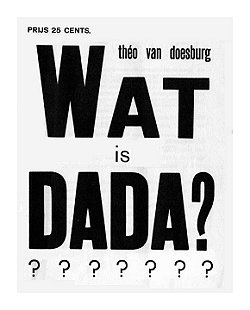 Avond in PERDU rondom Dan Dada doe uw werk!
Avond in PERDU rondom Dan Dada doe uw werk!
Met: Hans Croiset, Jaap Blonk, Matthijs de Ridder, Hubert van den Berg & Geert Buelens
Dan Dada doe uw werk!
Boekpresentatie Uitgeverij Vantilt
Stichting Perdu Amsterdam
maandag 3 november 20:00
Zaal open: 19.30 uur
Entree: Gratis
Ter ere van het verschijnen van de bloemlezing Dan dada doe uw werk! door Hubert van den Berg en Geert Buelens (red.) organiseert Uitgeverij Vantilt in samenwerking met Perdu een avond rondom avant-gardistische poëzie uit de Lage Landen. Matthijs de Ridder gaat in gesprek met Hubert van den Berg en Geert Buelens, waarna (stem)acteur Hans Croiset en stemkunstenaar Jaap Blonk zullen voordragen uit Dan dada doe uw werk! Het programma begint om 20.00 en is ongeveer 22.00 afgelopen.
Piet Mondriaan, I.K. Bonset, Paul van Ostaijen, Herman van den Bergh, Hendrik de Vries, H. Marsman, Pierre Kemp, Kurt Schwitters, Antony Kok, Victor J. Brunclair, Til Brugman, Gaston Burssens, A.C. Willink, Michel Seuphor, H.N. Werkman
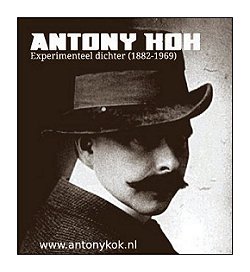 Stichting Perdu
Stichting Perdu
Kloveniersburgwal 86
1012 CZ Amsterdam
Tel: 020 627 62 95
Stichting Perdu – het theater, de poëzieboekhandel en de uitgeverij – is zeer centraal gelegen op Kloveniersburgwal 86, om de hoek bij de Nieuwe Doelenstraat, dus vlakbij het Waterlooplein en Café De Jaren.
# Website PERDU
fleursdumal.nl magazine
More in: - Book News, Art & Literature News, Dada, Doesburg, Theo van, EXPRESSIONISM, DADA & DE STIJL, SURREALISM, Kok, Antony, Kurt Schwitters, Piet Mondriaan, Schwitters, Kurt, Theo van Doesburg, Werkman, Hendrik Nicolaas
Thank you for reading Fleurs du Mal - magazine for art & literature